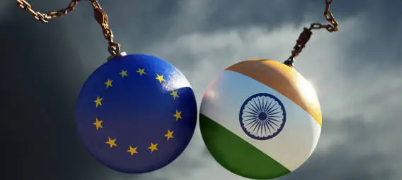
Recently, The European Union (EU) unveiled its 18th sanctions package against Russia, intensifying pressure on the global oil supply chain. Among its most striking provisions was a move to ban the import of oil refined in third-party countries using Russian crude. While seemingly a broader strategy, the EU’s move directly targeted India’s Nayara Energy — the country’s second-largest refinery based in Vadinar, Gujarat. But what followed was not a meek protest from India; it was a calculated, bold counter-offensive that forced the EU to rethink its assumptions about India’s diplomatic and economic resolve.
EU’s Targeted Ban on Russian Oil and Nayara Energy
The EU’s latest sanctions go beyond targeting Russian-origin oil directly. This time, the bloc stated that even if Russian oil is refined in a third country and then exported to the EU, it will fall under sanctions. As a result, Nayara Energy, which has a partnership involving Russian interests, found itself directly in the crosshairs. The EU announced it would cease all purchases from Nayara Energy starting January 2026, regardless of whether the refined products originated from Russian crude or not.
For context, Nayara Energy — formerly known as Essar Oil — is a major player in India’s energy landscape, refining large volumes of crude including Russian oil. Given its ties and location, it was an easy target in the EU’s broader geopolitical chess game.
India’s Strategic Countermove Begins
The EU perhaps expected a standard diplomatic objection from India. But what they didn’t anticipate was the swift, tactical response from Nayara Energy itself. Soon after the sanctions were declared, Nayara issued an export tender for a naphtha cargo, between 33,000 to 35,000 metric tonnes, intended for an EU-based buyer. But this time, Nayara placed stringent conditions: either full advance payment or an irrevocable Letter of Credit (LC).
The European buyers, unwilling or unable to meet these financial terms, saw the tender canceled outright by Nayara. The refinery didn’t stop there — the same cargo was later sold to a major oil player in the Middle East at a premium of $2.5 to $3 per barrel. In effect, the EU not only lost a key energy shipment but also lost face — and Nayara gained better margins and a new strategic partner in the Middle East.
Preparing for the Full Sanctions Impact in 2026
Both Nayara Energy and Reliance Industries — India’s two major private refiners that export to Europe — are already repositioning themselves ahead of the January 2026 full implementation of the EU sanctions.
Reliance Industries has chalked out a multi-pronged strategy. It will reduce its reliance on Russian crude and increase its imports from Abu Dhabi and other Middle Eastern sources. Additionally, refined diesel that was earlier destined for the EU is now being rerouted to markets in Asia and Africa, where margins are competitive and geopolitical risks are lower.
Nayara Energy, for its part, is taking a multi-front approach:
Imposing strict payment conditions like advance payment or LC on sensitive buyers
Canceling tenders if financial terms aren't met
Diverting its products to premium-paying buyers in the Middle East
Considering legal challenges to the EU’s discriminatory sanctions
Announcing a massive ₹70,000 crore investment plan within India to strengthen domestic operations and reduce export dependency
India’s Broader Refinery Ecosystem Shields Itself
Another overlooked strength of India is that public sector refineries like Bharat Petroleum (BPCL) and Indian Oil Corporation (IOCL) primarily use Russian crude for domestic supply rather than for exports. This insulates them from EU sanctions almost entirely. Moreover, India has already scaled down the volume of fuel exports to Europe. What remains is now being sold more lucratively in markets across Asia and Africa.
A Political, Strategic, and Economic Message
India’s Ministry of External Affairs didn’t hold back in its criticism of the EU’s new rules, calling them discriminatory and unnecessary. The ministry clarified that India does not accept such double standards and will not compromise its economic interests.
More than just a business tactic, Nayara Energy’s response symbolizes India’s new global posture — one that is assertive, strategic, and independent. No longer is India dancing to anyone’s tune. It is choosing its path based on national interest, global opportunity, and long-term strategic autonomy.
Final Thoughts
Nayara Energy’s firm stand and tactical business response have sent an unmistakable message to the European Union: India is not just a passive marketplace — it is an emerging global power with the confidence and capability to push back.
From diplomatic corridors to business boardrooms, India is proving that it will not be pushed around. It will act with wisdom, strength, and a firm commitment to its sovereign rights. In this evolving global order, Nayara’s move is not just a business decision — it’s a symbol of national pride and economic self-reliance.




